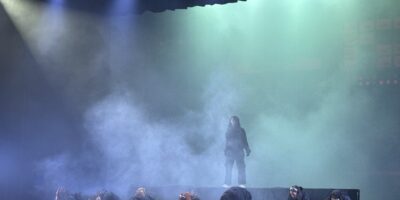Philip K. Dick is a funny name for a great American science-fiction writer. He was born in December 16, 1928 in Chicago, Illinois and wrote 121 short stories and 45 novels. Philip K. Dick is considered one of the most visionary authors of the twentieth century and is the first science-fiction writer to be included in The Library of America series, a series of classic American literature with significant literary and cultural value. Though you may not have known his name, his work has been the basis for many famous movies and television shows such as Blade Runner, Total Recall, Minority Report, A Scanner Darkly, and The Man in the High Castle. The works selected for this column are Do Androids Dream of Electric Sheep?, The Man in the High Castle, and Ubik. If you like to be completely surprised when reading, please do not read any further because the warning of spoilers is a spoiler in itself.
Do Androids Dream of Electric Sheep?
Do Androids Dream of Electric Sheep? was published in 1968 and is the basis for the movie Blade Runner. This post-apocalyptic novel is set in San Francisco after a great nuclear war, called World War Terminus, which had damaged most of Earth’s life. Most animal species have become extinct or endangered from the extreme radiation poisoning, so to encourage empathy towards animals and as a sign of status, people take care of android animals. To own a real animal would be rare and extremely expensive, as many animals have died from extreme radiation poisoning. The story follows Rick Deckard, a bounty hunter who “retires” humanoid androids who have infiltrated human society. These androids are identical to humans and it is the bounty hunter’s job to “retire”—or effectively, kill—rogue androids. In order to buy a new live animal to replace his electric sheep, Deckard takes on a case to retire six Nexus-6 androids who violently fled to Earth from a mine on Mars. In the process of retiring these androids, Deckard faces the need for existential fulfillment and contemplates the ethical questions that his line of work raises.
This dystopian novel explores religion, government intervention, and the ethical use of artificial intelligence and technology. After World War Terminus, the world is reduced to rubble and most of its natural life is gone. Only people and technology remain: technology is now available to regulate emotions, technology preaches a new religion of empathy through virtual reality, and people and animals have been perfectly imitated in the form of androids. Do Androids Dream of Electric Sheep? brings into question whether these emotions, beliefs, and artificial existences are real or not, and ultimately, if the pursuit of truth is a worthwhile goal.
The Man in the High Castle
The Man in the High Castle was published in 1962 and provides an alternative history where the Axis Powers (Imperial Japan and Nazi Germany) are victorious in World War II. The Axis Powers now rule over the United States, where the eastern part of the country is under German control, and the west, now called the “Pacific States of America” (PSA), is under Japanese control. In this parallel history, President Franklin Roosevelt was assassinated in 1933, leading to the continuation of the Great Depression and U.S. Isolation. By 1947, the Allies had surrendered to the Axis Powers. The novel is set 15 years later, and Imperial Japan and Nazi Germany are now competing world powers. Nazi Germany now has advanced technology, where they drained the Mediterranean Sea to create farmland, developed and used the hydrogen bomb, and designed high speed rocket travel to colonize Mars, Venus, and the Moon. Throughout the novel, characters use the I Ching, an ancient Chinese divination text, to make important decisions.
The most intriguing thing about this novel is that many of the characters have read a fictional novel called The Grasshopper Lies Heavy. The Grasshopper Lies Heavy is banned in the German occupied United States and is widely read in the PSA. The Grasshopper Lies Heavy tells the story of an alternative reality where President Roosevelt survives his assassination attempt and the Allies win World War II. The British Empire becomes more racist and expansionist after the War and the U.S. resolves racism by the 1950’s. This causes racial-cultural tensions between the British Empire and the U.S. leading to a Cold War.
This book within a book blew my mind, as well as the fact that Dick used the I Ching when writing The Man in the High Castle, as his characters used the I Ching to make their major decisions.
Ubik
Ubik was published in 1969 and is set in 1992, where humanity has colonized the Moon and people have psychic powers. Joe Chip is a technician working for Runciter Associates. He lives in an apartment equipped with coin-operated appliances, where you have to pay money every time you want to unlock the door or use the phone in your own home. Runciter Associates is run by Glen Runciter, a “prudence organization” which employs “inertials”, people with the ability to negate the powers of telepaths and “precogs”, to enforce privacy of clients. Runciter Associates is also run by Runciter’s deceased wife, Ella, who is kept in a state of “half-life” a form of cryonic suspension that allows limited consciousness and the ability to communicate even after death. Runciter discovers that Ella’s consciousness is being invaded by a more dominant half-lifer, Jory Miller. Runciter Associates is hired by Stanton Mick to secure lunar facilities; with a team of 11 inertials, Runciter and Chip travel to the lunar facility, only to find out this assignment was a trap, and a bomb blast in the lunar facility kills Runciter. After the explosion, the rest of the team experiences shifts in reality and start to die off one by one, leaving only Chip to try to make sense of what is happening. Chip wards off danger through the use of Ubik, a product that is advertised at the beginning of every chapter.
The end of the novel makes you wonder what is real and what isn’t. You read the novel and accept whatever is happening as reality in the novel only to be completely wrong by the end of the novel. Too many of these books have M. Night Shyamalan-like endings – I cannot discuss the ending too much but it is awesome and mind-blowing. There is a reason why this is on the TIME’s top 100 books published since 1923.




Leave a Reply